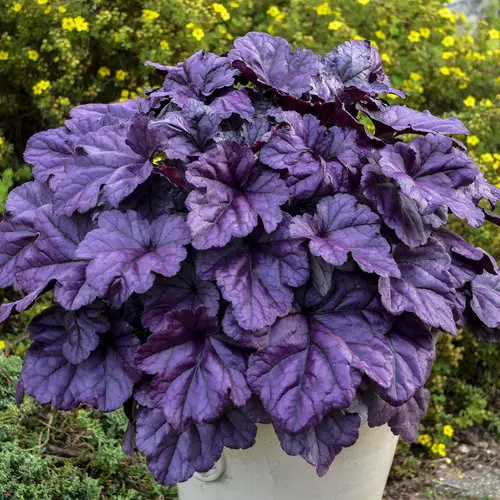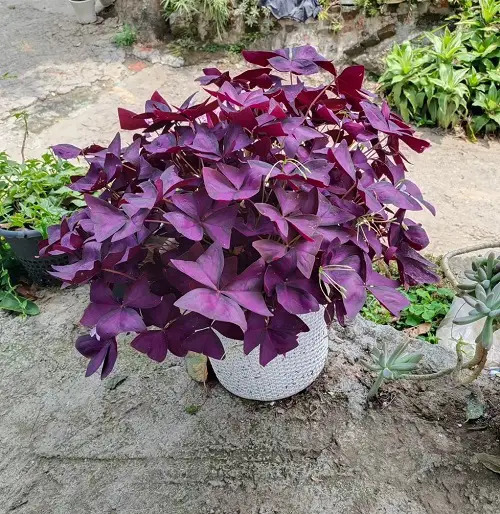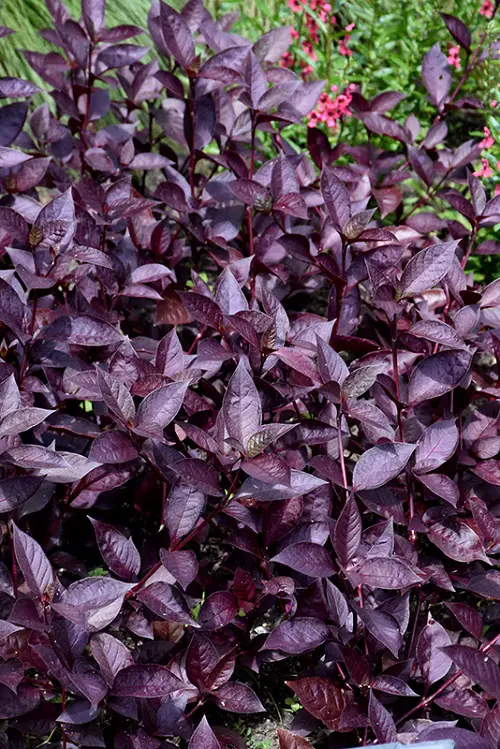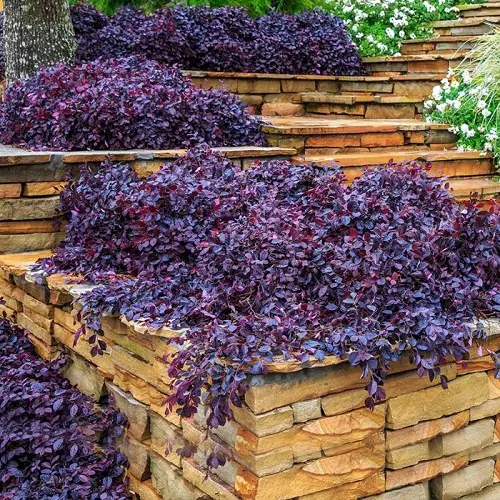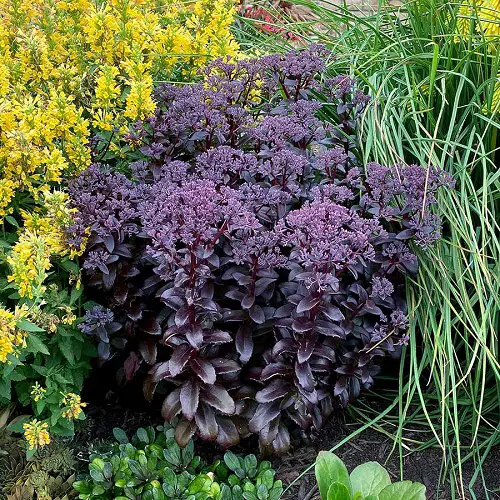No blooms? No worries! These outdoor plants with violet leaves will brighten and color your garden throughout the seasons!
Foliage plants are underrated—they do much to keep a garden alive, while blooms get all the credit! This article focuses on outdoor plants with dark violet and purple leaves, which are perfect for creating contrasting waves of color through the seasons, even in the absence of blooms!
Outdoor Plants with Violet Leaves
1. Coleus
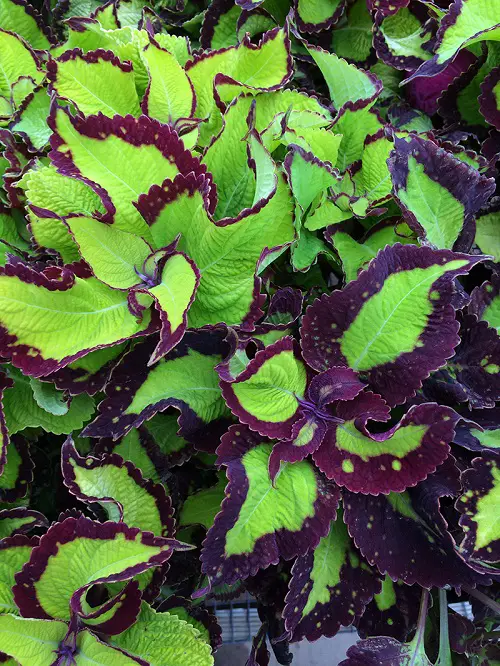
Botanical Name: Coleus scutellarioides
USDA Zones: 9–11
The heartthrob of all foliage plants, coleus is an exquisite garden staple for aesthetic leaves. With a mindblowing variety of cultivars sporting different hues, patterns, textures, and combinations, coleus varieties will make you forget all about blooms!
Coleus has numerous violet, purple, and near black-hued cultivars with patterns in chartreuse, burgundy, and red, including the famous Wicked Witch, Purple Prince, Amethyst, Apocalypse, etc. Whatever your preferences, there’s one waiting for you!
This mint family member prefers well-draining soil, regular watering, and dappled sunlight. Here’s how to use it for landscaping.
2. Persian Shield
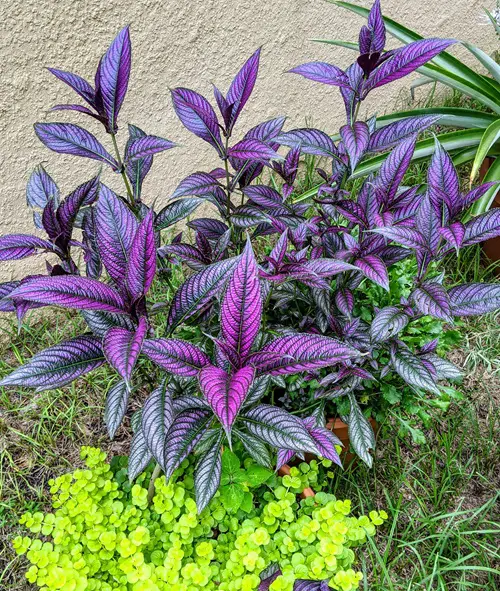
Botanical Name: Strobilanthes dyerianus
USDA Zones: 9-11
With shimmery purple and silver lance-shaped foliage that lasts through the year, the heat-tolerant Persian shield gives the classic coleus tough competition! It gets its deep violet hues from high levels of anthocyanin pigments.
Scaling up to three feet tall, this plant thrives in bright, indirect light, well-draining, rich soil, and warm weather. Pinching back the stems makes it bushy and full and you can also grow it indoors if you have a bright windowsill.
3. Coral Bells
Botanical Name: Heuchera
USDA Zones: 3-9
Coral Bells are popular outdoor foliage groundcovers that come in an array of hues, shapes, and patterns. Perfect for perennial borders and edges in mass plantings, varieties like Purple Palace, Violet Shimmer, and Pink Panther emerge in stunning spectrums and shades of violet.
Producing clusters of white to burgundy bell-shaped blooms in summer, heucheras grow well in full to partial sun and slightly acidic, well-draining, organic-rich soil. Best planted in late fall, these short-lived perennials can last through regular division.
4. Japanese Barberry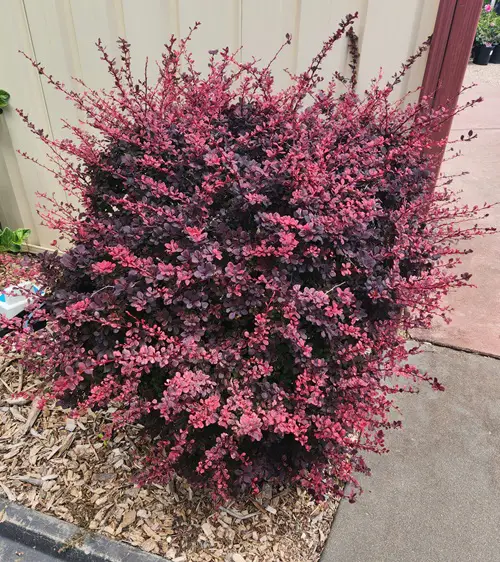
Botanical Name: Berberis thunbergii
USDA Zones: 4-8
The Japanese barberry, especially the ‘Atropurpurea’ variety, is a perfect outdoor hedge or barrier plant with a 4-foot stature and eye-catching violet foliage. Its tiny, oval leaves change hues with each passing season, and its color gets deeper with brighter light!
Hardy and drought-tolerant, this deciduous shrub is a prolific self-seeder and thrives in well-draining soil and full sun.
5. Bugleweed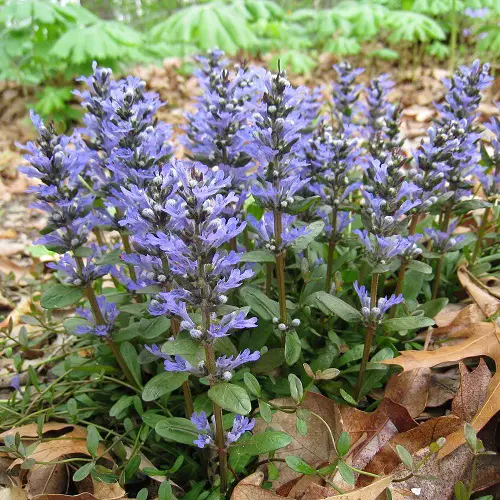
Botanical Name: Ajuga reptans
USDA Zones: 3-10
Sporting dark green leaves with purple to violet highlights, bugleweed is an excellent ground cover that stays compact at less than a foot. Its purple quotient amplifies around spring and summer when it produces bluish-violet blooms on spikes.
The violet hues of its foliage deepen in cool weather and dappled sunshine. Bugleweed does well in a range of soils, especially moist mediums. It prefers partial shade and needs moderate watering to prevent drying out.
6. Purple Heart
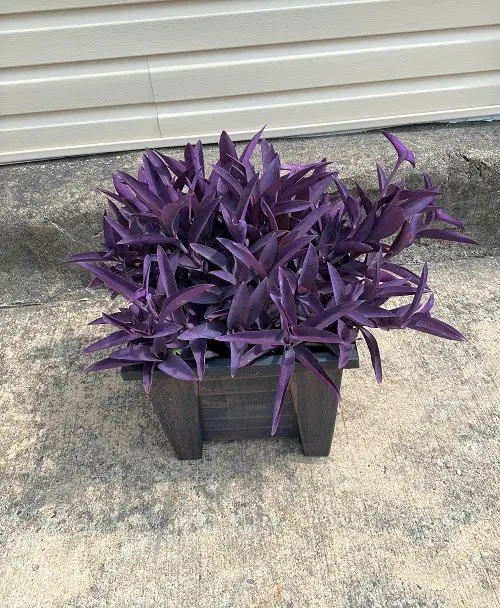
Botanical Name: Tradescantia pallida
USDA Zones: 7–11
Torn between violet flowers and foliage? With Purple Heart, you can have both! This Mexican spiderwort variety has sword-like leaves in bright violets and deep purples with a trailing habit.
An excellent ground cover, it produces pink and violet flowers that last only a day and then fall off. Grow it in well-draining, rich, moist soil with ample sunshine. Here are tips to help you.
7. Purple Shamrock
Botanical Name: Oxalis triangularis
USDA Zones: 8-11
This South American native has deep maroon to violet leaves and pink blooms, which fold and close at night, under harsh sun, or when disturbed. It grows well in light shade and dappled sun and goes into dormancy in temperatures above 81 F (27 C).
With a compact growth habit, it thrives in well-draining loam or sandy soil. Follow these tricks to grow a big one.
8. Joseph’s Coat
Botanical Name: Alternanthera dentata
USDA Zones: 9-11
Native to the tropical regions of Carribean and South America, Joseph’s Coat is a perennial that cannot be left out of a list of violet-leaved plants! Its ornamental foliage with dentate margins lasts long—up to the first frost. Try the Little Ruby variety—it’s the prettiest.
You can grow it in containers or as a bushy border or hedge. It can reach up to three feet tall and prefers moist, fertile, well-draining soil.
9. Chinese Fringe Flower
Botanical Name: Loropetalum chinense
USDA Zones: 7-10
Chinese fringe flower varieties like Carolina Midnight and Purple Pixie sport rich, dark violet leaves that make them an inevitable part of this purple foliage list! With velvety leaves, the plant produces clusters of bright pink flowers in spring.
Growing up to a few feet tall, it prefers full sun to partial shade, regular watering during dry spells, and occasional pruning for robust, fresh growth.
10. Black Cohosh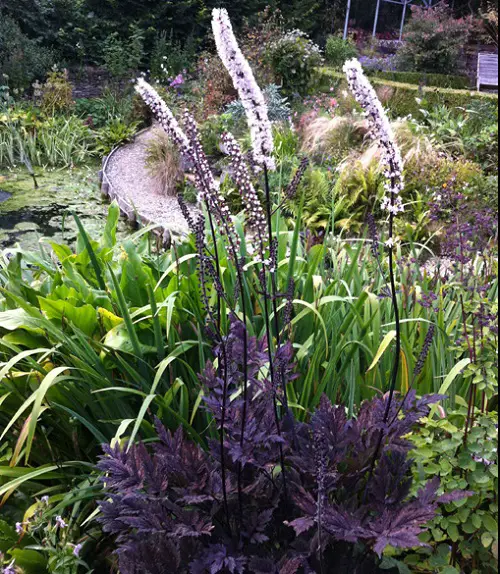
Botanical Name: Actaea racemosa ‘Atropurpurea’
USDA Zones: 3-8
This variety of black cohosh has lush burgundy to violet leaves and stems and stays fresh through the growing season. Scaling up to five feet, this low-maintenance North American native grows well in shade and is ideal for adding a vertical accent to a border or fence in a woodland setting.
Once established, it can tolerate drought. To bring out the best leaf colors, keep it watered and in a light shade.
11. Stonecrop
Botanical Name: Sedum ‘Purple Emperor’
USDA Zones: 3-7
Purple Emperor is a stonecrop variety with an upright growth habit, fleshy violet leaves, and star-like lilac blooms atop purple stems. A vision in violet, it stays fresh and lush through its growing season.
Thriving in sandy to gravelly soil with average fertility, sedums tolerate drought, heat, and light shade once established.


